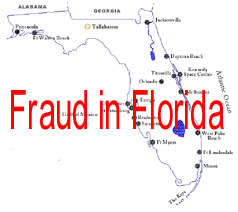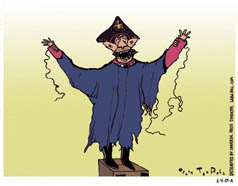Why Do We Believe That George Bush Is A Man Of Conviction?
Melinda Henneberger has a very good column in this week's edition of Newsweek, entitled "Is Iraq A Just War?" Henneberger concludes that the Iraq war is not a just war, but declines to indict the Deserter for cynically launching us into an unjust war:
I am not among those critics who believe that our president sent soldiers into Iraq to grab their oil, or to finish what his father started, or even to help him win re-election this November. On the contrary, I look at Bush and see a man who firmly believes he did the right thing. But as both admirers and critics have often noted, it would be out of character for him to feel otherwise.I cannot subscribe to this theory that George Bush was firm in his conviction that the U.S. must depose Saddam, that he was possessed of a messianic fervor to rid the world of the Iraq threat, or that he was convinced he was "doing right."
There were certainly many in his Administration that fit this description of a "true believer" in the cause of war on Iraq, and we know who they are: Cheney, Rumsfeld, Wolfowitz, Feith and Libby. And we know how they reacted in the aftermath of September 11th. Woodward's book, as well as accounts provided by Richard Clarke and others, recount how the neocons (particularly Rumsfeld and Wolfowitz) seemed to assume that a move against Iraq would be part of the immediate response to the 9/11 attacks, even though there was no reason to believe that Iraq was involved. The "true believers" vociferously opposed efforts by the Administration to go to the U.N. to enlist broader support for the war, fearing that a resounding rebuff would impede the drive to war. The "true believers", particularly Cheney, were unequivocal in their claims that Iraq possessed weapons of mass destruction. However, none of these reactions, attitudes or beliefs can be ascribed to George Bush. George Bush's actions and statements in the aftermath of September 11th and through the end of 2002 reveal a picture of a man more cautious than hellbent, a man riding a war tiger lashed by the neocons rather than a man doing the lashing.
The scene at the White House on September 12, 2001 is very illuminating. Rumsfeld had already decided that Iraq was the target, lamenting that there weren't "enough good targets" in Afghanistan (it's true; you can't make this stuff up). "I realized," former counterterror chief Richard Clarke recalls of the September 12th meeting, "that Rumsfeld and Wolfowitz were going to try to take advantage of this national tragedy to promote their agenda about Iraq." None of the accounts of the September 12th meeting indicate that the presence or absence of evidence of Iraqi involvement in 9/11 was considered important, even though strikes against Iraq were a prominent option and seemingly the primary option in the opinion of Rumsfeld and Wolfowitz. Rather, Bush waited until after the meeting, outside of the presence of the neocons, to raise with Clarke the question of whether Iraq may have been involved in the 9/11 attacks. The true believers, like Rumsfeld and Wolfowitz, had already deemed evidence irrelevant. Bush however, according to Clarke's account, seemed almost desperate to establish a Saddam connection, and he raised it with Clarke after the neocons had departed because any suggestion that a valid Iraqi connection was a necessary pretext for war against Iraq would have branded him a heretic in the Church of the Neocons.
The debate within the administration regarding whether to seek U.N. support for the war on Iraq has been widely reported, and the vehement opposition of the administration's neocons to Colin Powell's efforts to broaden support for the Iraq war has been well documented. This is one battle (perhaps the only one in the Iraq theatre) that Powell won, however, as Bush sanctioned Powell's attempt to build an international coalition. Powell's inability to form that coalition, burdened as it was by just skepticism in the international community about the neocons intentions and the grandstanding of Jacques Chirac, has inarguably rendered the Iraq war a diplomatic defeat for the U.S. and a catastrophe for American leadership in the world. Bush's willingness to permit Powell to make an attempt, however, signals that he was not a "true believer." This is not to say that Bush envisioned a U.N. rebuff as a means of avoiding war, but rather that Bush was willing to suffer a bump on the road to war in exchange for the political cover provided by the apparent diplomatic attempt at the U.N.
On the subject of Iraqi WMDs, Bush, although willing to insinuate the worst about Saddam's capabilities, was careful to avoid unequivocal claims of Iraqi WMD capabilities. Careful, that is, until Cheney stated in an August 26, 2002 speech before the Veterans of Foreign Wars in Nashville that "[t]here is no doubt that Saddam Hussein now has weapons of mass destruction." This claim, so conspicuously at odds with the administration's reluctance to date to make such an unequivocal claim, was made by Cheney without Bush's prior knowledge or approval according to Woodward. Bush immediately began emulating Cheney's misguided certainty. Again, the picture is one of Bush following, not leading the way.
No, George Bush is not a "true believer", nor was he motivated by anything beyond base political calculations in his decision to go to war with Iraq. He made a deal with the neocons for their support prior to nailing down the Republican nomination. The selection of neocon insider Dick Cheney as Bush's running mate was one of the quid pro quos obtained by the neocons for their pledge of support. The other quid pro quo was that George Bush would do what it took to get rid of Saddam Hussein and secure Iraq as a base for U.S./Israeli hegemony in the middle east. Bush fully realized the political risks inherent in this course of action but, as any presidential aspirant knows, you first take care of getting into the White House, then you worry about what you'll do when you get there. Bush's sensitivity to the political risks attending a headlong rush into war with Iraq explains his relative footdragging in the war dash, but his political sensitivities also told him that if he crossed the neocons they'd terminate his presidency, just as they had the presidency of his father.
So George W. Bush played ball with the neocons, held up his end of the bargain, and committed the U.S. to a war that was doomed to failure from the start for lack of international support and the inevitability of a lengthy and bitter occupation. Worst of all, from Bush's political perspective, the Iraq war has not proved a political asset. Perhaps had he dragged his feet a little more the war would not have started until months later, and the full consequences of the failure to find WMDs, the realities of the occupation and the hopelessness of our situation in Iraq would not yet be apparent to the electorate. But that would have run the risk that Hans Blix and the U.N. weapons inspectors, already close to certifying Saddam's full cooperation in March 2003, would have derailed the war effort altogether by reporting that Iraq was WMD-free. So Dubya finds himself today in roughly the same position as his father was in May of 1992: fallen from the heights of popularity provided by a swift military victory and watching helplessly as the aftermath of war overwhelms his presidency.
Like father, like son. If only, for the sake of our country, George the First would have taken his son aside in January or February or March of 2003 and whispered in his hear, speaking of the Iraq war option, "wouldn't be prudent."




0 Comments:
Post a Comment
<< Home